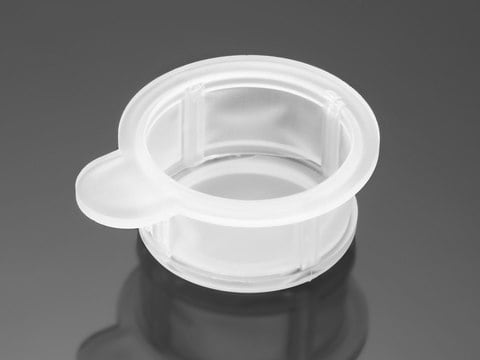D1947
Diffinity RapidTip®
for PCR Purification
Synonyme(s) :
PCR clean up tip, PCR purification tip, PCR reaction clean-up tip
Se connecterpour consulter vos tarifs contractuels et ceux de votre entreprise/organisme
About This Item
Produits recommandés
Niveau de qualité
Forme
solid
Fabricant/nom de marque
(Diffinity Genomics, Inc.)
Capacité
50(µL)
Température de stockage
room temp
Vous recherchez des produits similaires ? Visite Guide de comparaison des produits
Description générale
Diffinity RapidTip effectively removes dNTPs, primers and primer dimers while providing greater than 90% recovery of pure DNA fragments from 100 bp to 10 kb. The functional pipette tip contains everything you need for PCR purification. The tip is filled with a proprietary adsorption technology that has a differential affinity for PCR components. The dispensed solution yields purified, high quality DNA ready for downstream applications such as DNA sequencing, SNP analysis and microarray printing.
Application
Diffinity RapidTip® has been used in PCR product purification.
Caractéristiques et avantages
- Single step
- Recovers 90% of high quality dsDNA
- Optimized for 25 μL RXN
Informations légales
RapidTip is a registered trademark of Diffinity Genomics, Inc.
Certificats d'analyse (COA)
Recherchez un Certificats d'analyse (COA) en saisissant le numéro de lot du produit. Les numéros de lot figurent sur l'étiquette du produit après les mots "Lot" ou "Batch".
Déjà en possession de ce produit ?
Retrouvez la documentation relative aux produits que vous avez récemment achetés dans la Bibliothèque de documents.
H Kühlwein et al.
Journal of applied microbiology, 115(5), 1091-1106 (2013-07-31)
To assess the effects of dietary Saccharomyces cerevisiae β-(1,3)(1,6)-D-glucan supplementation (MacroGard(®)) on mirror carp (Cyprinus carpio L.) intestinal microbiota and ultrastructure of the enterocyte apical brush border. Carp were fed either a control diet or diets supplemented with 0.1, 1
Sarah L Dean et al.
Molecular ecology, 23(6), 1364-1378 (2013-10-12)
Nitrogen (N) deposition rates are increasing globally due to anthropogenic activities. Plant community responses to N are often attributed to altered competitive interactions between plants, but may also be a result of microbial responses to N, particularly root-associated fungi (RAF)
Teruaki Nakatsuji et al.
Nature communications, 4, 1431-1431 (2013-02-07)
Commensal microbes on the skin surface influence the behaviour of cells below the epidermis. We hypothesized that bacteria or their products exist below the surface epithelium and thus permit physical interaction between microbes and dermal cells. Here to test this
Michael J Goblirsch et al.
PloS one, 8(7), e69831-e69831 (2013-07-31)
A major hindrance to the study of honey bee pathogens or the effects of pesticides and nutritional deficiencies is the lack of controlled in vitro culture systems comprised of honey bee cells. Such systems are important to determine the impact
Lisa A Santry et al.
Virus research, 175(1), 30-44 (2013-04-16)
Maedi-visna virus (MVV) and caprine arthritis encephalitis virus (CAEV) are related members of a group of small ruminant lentiviruses (SRLVs) that infect sheep and goats. SRLVs are endemic in many countries, including Canada. However, very little is known about the
Notre équipe de scientifiques dispose d'une expérience dans tous les secteurs de la recherche, notamment en sciences de la vie, science des matériaux, synthèse chimique, chromatographie, analyse et dans de nombreux autres domaines..
Contacter notre Service technique









